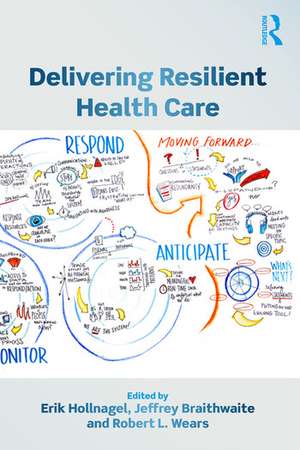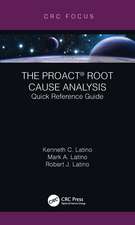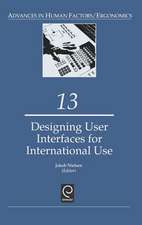Delivering Resilient Health Care
Editat de Erik Hollnagel, Jeffrey Braithwaite, Robert L. Wearsen Limba Engleză Paperback – 30 aug 2018
Building on previous volumes, Delivering Resilient Health Care presents documented experiences and practical guidance on how to bring Resilient Health Care into practice. It provides concrete advice on how to prepare a study, how to choose the right data, how to collect it, how to analyse the data, and how to interpret the results. This fourth book in the Resilient Healthcare series contains contributions from international experts in health care, organisational studies and patient safety, as well as resilience engineering.
This book provides a practical guide for delivering resilient healthcare, particularly for clinicians on the frontline of care unsure how to incorporate resilience into their everyday work, managers coordinating care, and for policymakers hoping to steer the system in the right direction. Other groups – patients, the media, and researchers – will also find much of interest here.
| Toate formatele și edițiile | Preț | Express |
|---|---|---|
| Paperback (1) | 353.40 lei 6-8 săpt. | |
| CRC Press – 30 aug 2018 | 353.40 lei 6-8 săpt. | |
| Hardback (1) | 1001.84 lei 6-8 săpt. | |
| CRC Press – 29 aug 2018 | 1001.84 lei 6-8 săpt. |
Preț: 353.40 lei
Nou
Puncte Express: 530
Preț estimativ în valută:
67.62€ • 73.69$ • 56.98£
67.62€ • 73.69$ • 56.98£
Carte tipărită la comandă
Livrare economică 23 aprilie-07 mai
Preluare comenzi: 021 569.72.76
Specificații
ISBN-13: 9781138602250
ISBN-10: 1138602256
Pagini: 248
Ilustrații: 36
Dimensiuni: 156 x 234 x 17 mm
Greutate: 0.38 kg
Ediția:1
Editura: CRC Press
Colecția Routledge
ISBN-10: 1138602256
Pagini: 248
Ilustrații: 36
Dimensiuni: 156 x 234 x 17 mm
Greutate: 0.38 kg
Ediția:1
Editura: CRC Press
Colecția Routledge
Public țintă
Academic, Professional, and Professional Practice & DevelopmentCuprins
1: Coming of Age; 2: The Need of a Guide to Deliver Resilient Health Care; 3: Procuring Evidence for Resilient Health Care; 4: Resilience Engineering for quality improvement: Case study in a unit for the care of older people; 5: Using workarounds to examine characteristics of resilience in action; 6: Simulation as a tool to study systems and enhance resilience; 7: Exploring resilience strategies in anaesthetists’ work: A case study using interviews and the Resilience Markers Framework (RMF); 8: Promoting resilience in the maternity services; 9: Team Resilience: Implementing resilient healthcare at Middlemore ICU; 10: Understanding normal work to improve quality of care and patient safety in a spine center; 11: Engineering resilience in an urban emergency department; 12: Patterns of adaptive behaviour and adjustments in performance in response to authoritative safety pressure regarding the handling of KCl concentrate solutions; 13: A case study of resilience in inpatient diabetes care; 14: Where process improvement meets resilience: a study of the preparation and administration of drugs in a surgical inpatient unit; 15: The Safety-II Case: Reconciling the gap between WAI and WAD through structured dialogue and reasoning about safety; 16: When Disaster Strikes: Sustained Resilience Performance in an Acute Clinical Setting; 17: Making it happen – from research to practice
Notă biografică
Erik Hollnagel is Senior professor of Patient Safety at Jönköping University (Sweden). He has worked at universities, research centres, and with industries in many countries and with such wide-ranging issues as nuclear power generation, aerospace and aviation, software engineering, land-based and maritime transportation, industrial production, and healthcare.
Jeffrey Braithwaite, Professor of Health Systems Research at Macquarie University (Australia), Founding Director of the Australian Institute of Health Innovation, Director of the Centre for Healthcare Resilience and Implementation Science, is a leading health services and systems researcher with an international reputation for his work.
Robert L. Wears, Professor in Emergency Medicine at the University of Florida (USA), was a senior physician and leading international expert in patient safety. He was a visiting professor at the Imperial College (UK), senior associate dean for hospital affairs and former chair of emergency medicine.
Jeffrey Braithwaite, Professor of Health Systems Research at Macquarie University (Australia), Founding Director of the Australian Institute of Health Innovation, Director of the Centre for Healthcare Resilience and Implementation Science, is a leading health services and systems researcher with an international reputation for his work.
Robert L. Wears, Professor in Emergency Medicine at the University of Florida (USA), was a senior physician and leading international expert in patient safety. He was a visiting professor at the Imperial College (UK), senior associate dean for hospital affairs and former chair of emergency medicine.
Recenzii
‘The change of perspective from Safety I to Safety II is a major breakthrough in thinking about patient safety. Putting the relation between "work-as-imagined" and "work-as-done" center stage, this book offers tools that help both scholars and practitioners in researching and designing safer health care systems.’ – Roland Bal, Professor of Healthcare governance, Erasmus University Rotterdam, The Netherlands
‘Medicine has been late to shift from a deterministic view of the universe to an emergent and adaptive one. This fourth book in a must-read series adds depth, detail and worked examples which illustrate why this shift is both important and urgent.’ – Trish Greenhalgh, Professor of Primary Care Health Sciences, University of Oxford, UK
‘This book is an important contribution in what is a key area of safety science within health care organizations – the field of resilient health care organizations. It presents interesting and novel ideas and also a powerful way of thinking about good practice which should be timely and relevant for front line clinicians, nurses and health managers alike.’ – Ewan Ferlie, Professor of Public Services Management, King’s College London, UK
‘As ideas from resilience engineering re-shape our thinking about health care, it is timely that new methodological insights also inform how researchers and practitioners apply these ideas to their improvement work. Hollnagel, Braithwaite and Wear again bring us essential learning on the practical application of resilience engineering to health care.’ – Justin Waring, Professor of Organisational Sociology, Nottingham University, UK
‘We need to deliver value from healthcare for ageing populations, with multi-morbidity, increasingly complex health care capability in which less may be more, emphasis on patient experience, and finite budgets in which we need to do more with less. These resilient health care strategies show us new ways to tackle these challenges.’ – Adrian Edwards, Professor of General Practice, Cardiff University, UK
'That problems in healthcare organization and delivery are perennial does not necessarily make them intractable. This inventive text will prove insightful to researchers, managers and policy makers interested in using the theory of Resilience Engineering to better understand and improve the organization and delivery of care across a range of healthcare settings.' – Russell Mannion, University of Birmingham, UK
'Insightful book edited by Erik Hollnagel, Jeff Braithwaite and Bob Wears; a great tribute to the late Bob Wears and his impact on safety science and practice. A must-read for deep, rich analysis of resilient health care' - Pascale Carayon, Procter & Gamble Bascom Professor in Total Quality, University of Wisconsin-Madison, USA
‘Medicine has been late to shift from a deterministic view of the universe to an emergent and adaptive one. This fourth book in a must-read series adds depth, detail and worked examples which illustrate why this shift is both important and urgent.’ – Trish Greenhalgh, Professor of Primary Care Health Sciences, University of Oxford, UK
‘This book is an important contribution in what is a key area of safety science within health care organizations – the field of resilient health care organizations. It presents interesting and novel ideas and also a powerful way of thinking about good practice which should be timely and relevant for front line clinicians, nurses and health managers alike.’ – Ewan Ferlie, Professor of Public Services Management, King’s College London, UK
‘As ideas from resilience engineering re-shape our thinking about health care, it is timely that new methodological insights also inform how researchers and practitioners apply these ideas to their improvement work. Hollnagel, Braithwaite and Wear again bring us essential learning on the practical application of resilience engineering to health care.’ – Justin Waring, Professor of Organisational Sociology, Nottingham University, UK
‘We need to deliver value from healthcare for ageing populations, with multi-morbidity, increasingly complex health care capability in which less may be more, emphasis on patient experience, and finite budgets in which we need to do more with less. These resilient health care strategies show us new ways to tackle these challenges.’ – Adrian Edwards, Professor of General Practice, Cardiff University, UK
'That problems in healthcare organization and delivery are perennial does not necessarily make them intractable. This inventive text will prove insightful to researchers, managers and policy makers interested in using the theory of Resilience Engineering to better understand and improve the organization and delivery of care across a range of healthcare settings.' – Russell Mannion, University of Birmingham, UK
'Insightful book edited by Erik Hollnagel, Jeff Braithwaite and Bob Wears; a great tribute to the late Bob Wears and his impact on safety science and practice. A must-read for deep, rich analysis of resilient health care' - Pascale Carayon, Procter & Gamble Bascom Professor in Total Quality, University of Wisconsin-Madison, USA
Descriere
This book, the fourth edition in the Resilient Healthcare series, contains contributions from international experts in health care, organisational studies and patient safety, as well as resilience engineering. This new edition provides a practical guide for delivering resilient healthcare, particularly for clinicians on the frontline of care.





















